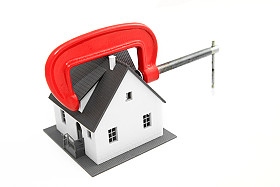Foreclosures
Foreclosure News Items
Part 2 of 2: Underwater? Alternatives to walking away
by Broderick Perkins
(05/10/2010) Home owners who are "underwater" with their home loan and seek to come up for air by walking away from the debt, could still be gasping for relief years down the road.

There are occasions when walking away from your home -- and down the road to foreclosure -- is your only option, but seldom is it the best alternative.
Mortgages are "underwater" or "upside down" when the property experiences negative equity -- the mortgage is larger than the current value of the property. Negative equity is caused by a decline property value, an increase in mortgage debt or, most likely, both.
The consensus among experts is to consider the alternatives before abandoning your home. Talk with your lender, seek counseling from a U.S. Department of Housing and Urban Affairs (HUD) certified counselor.
Don Bisenius, the head of Freddie Mac's home-loan guarantee business, recently asked borrowers to stick it out through the crisis.
Bisenius said foreclosures lead to degraded neighborhoods, more expensive mortgages and reduced home values.
"In the end, borrowers considering a strategic default should recognize the damaging impact their actions can have on others," he wrote.
The Obama Administration's frequently updated and strengthened multi-tiered MakingHomeAffordable.com program and other government efforts offer a good start with a host of options.
•Refinancing, turning in your existing mortgage for a new one, is perhaps the toughest option to accomplish. A refinance requires meeting stiff underwriting requirements -- an excellent credit report, a high credit score of 720 or more, documented career level income and little debt, for starters.
Federal programs including the Federal Housing Administration's refinance effort can be a good bet for those who haven't yet faced hardship and can qualify for a new loan.
• A mortgage modification reworks the terms of existing loans to get the payment down to a more affordable level. To add greater affordability lenders lower the interest rate, lengthen the term of the loan or reduce the principal -- or do some combination of all three. Modifications can be used by qualified home owners who aren't yet struggling as well as those who are in a pinch.
Short sales can be particularly useful for home owners struggling with underwater mortgages. The bank allows the sale of a home for less than the existing mortgage balance, typically provided there's a qualified buyer in the wings. A similar deed-in-lieu-of-foreclosure allows the home owner to simply hand over the property to the bank without a foreclosure. In some cases sellers get up to $3,000 to help defray moving costs.
Modifications and short sales can impact your credit, but not necessarily with the force of a foreclosure.
• Sell. A good real estate agent experienced in tough market cycles can garner the best price. Some sellers might have to come up with the difference between the mortgage and selling price to make good on a home they no longer own. Others, especially long-term owners, could break even or come out of it with a tidy profit.
Bottom line, exploring all the options is a better first step than walking away.
"It is a very personal choice. I understand feeling financial pressure is difficult and embarrassing, but there is a point at which everyone has time to explore the options. In just about every case, that's much better than doing nothing at all. I strongly feel there is no reason for anyone to get a foreclosure" said Zdenka Mahan, a real estate agent with Intero Real Estate in Los Gatos.
Also see: Part 1 of 2 -- Underwater? Walking away from your mortgage could really sink you
More Related Articles:
PreventLoanScams.com coalition goes after mortgage modification fraud
Bank of America, Flagstar to Offer Mortgage Programs for Unemployed Borrowers
Government Ramping Up New Short Sale Program
Record Low Mortgages and New Programs: Hope for Homeowners

